24 Jun From city store to farm: How Save-On-Foods and FoodMesh closed the urban food waste loop
Save-On-Foods has long been a leader in food waste reduction, working with FoodMesh and Loop Resources since 2018 to ensure its unsold food is put to its highest and best use. By donating edible food to local charities and redirecting food unfit for human consumption to farmers as animal feed, and sending what was left to compost, Save-On-Foods has made remarkable progress—diverting over 90% of its unsold food away from landfill – significantly higher than the industry standard diversion rate of 75%.
However, for its urban stores in Metro Vancouver, diverting inedible food to farmers posed a significant challenge. While edible food continued to be donated to charities, the lack of nearby farms meant the majority of the remaining inedible food was often composted. Recognizing the opportunity to do more with their unsold food, Save-On-Foods turned to FoodMesh for a solution.
In response, FoodMesh launched an innovative program with its’ charity partners, which was simple, yet impactful: Charities would collect both the human edible and inedible donations from the stores. They would continue to use the edible food for their food security programs, and redistribute the inedible product to farmers located within the charities’ existing distribution routes. To contribute to the additional efforts related to the increased collection and distribution of farm feed, FoodMesh revised its existing revenue-sharing model so the charities received increased financial support.
The pilot proved to be a win-win for everyone involved. Save-On-Foods’ stores increased the amount of food they diverted away from landfill, farmers gained access to animal feed they previously couldn’t collect due to the distance from urban stores, and the charities reported an increase in the volume of edible food they were able to recover and redistribute to people in need.
By finding innovative ways to integrate farmers into the food diversion network across all of its stores—both urban and rural—Save-On-Foods can have maximum impact, by ensuring its surplus food supports people first, and animals next.
This philosophy extends beyond Save-On-Foods. In 2024, Pattison Food Group (PFG), parent company of Save-On-Foods, donated food to more than 3,200 charities and farms, helping create over 76 million meals that would have otherwise gone to waste. Environmentally, PFG reduced its greenhouse gas emissions by 14%—even while adding 32 new stores—thanks to the growing scale of its food recovery efforts. By working with FoodMesh to rethink urban food recovery, Save-On-Foods, and the Pattison Food Group more broadly, continues to raise the bar for sustainability in the retail industry.
Written by Claire Lustig, Operations Specialist
Related stories
How Save-On-Foods surpassed its food waste reduction goals and set a new standard for sustainability in the grocery industry
And supports over 3,000 hunger-relief organizations and hobby farmers in the process.
Food recovery program helps support Creston Food Bank and reduce waste
Creston Valley Advance reports on how FoodMesh's Retail Food Recovery Program has helped Creston Food Bank and Save-On-Foods save thousands of kilograms of food from the landfill
How Save-On-Foods is helping North Vancouver farm animals live long and healthy lives
Maplewood Farm's 76 animals now get to enjoy fresh produce from its local Save-On-Foods, thanks to this new partnership
How Save-On-Foods helps the Richmond Food Bank get a supply of fresh food donations
Richmond News reports on what supermarkets in Richmond do with the food they can no longer sell






